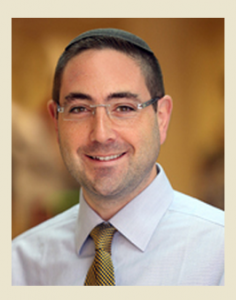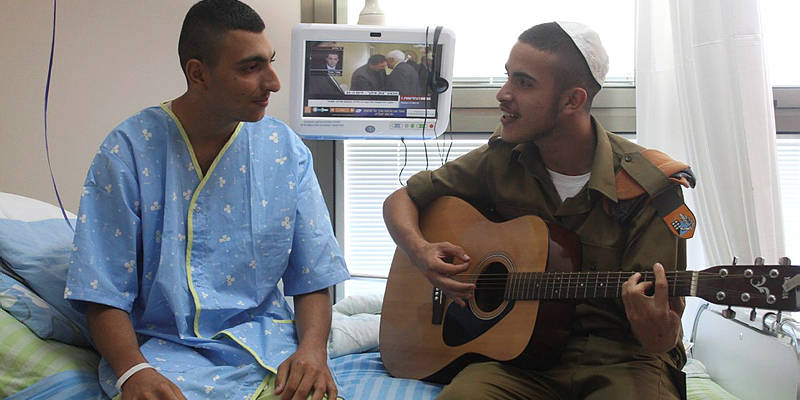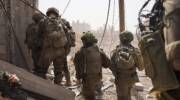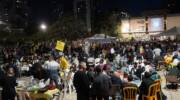
By Rabbi Ari Enkin, rabbinic director, United with Israel
Israelis across the country are visiting the wounded, preparing care packages, helping families with a father at the front lines and, unfortunately, attending funerals. Rabbi Ari Enkin, United with Israel’s rabbinic director, gives his impressions after visiting IDF soldiers in a Jerusalem hospital.
Today I decided to take a few hours off to go and visit some of the wounded soldiers at one of the Jerusalem hospitals. After making a few inquiries, I found out that there are four soldiers at Shaare Zedek hospital in Jerusalem. I am unable to divulge their names in this forum, but for those in the area who may be able to visit them, I am able to share with you that three can be found in the orthopedic ward (8th floor) and one in the urology ward (7th floor). All of the soldiers I would visit today were wounded in the Hell hole called Khan Yunis in the Southern Gaza Strip. As you can see, a very small number of soldiers are sent to Shaarei Tzedek hospital; most can be found in Tel Hashomer (Sheba) near Tel Aviv and in Soroka in Be’er Sheva, although there is a large number of soldiers in Jerusalem’s Ein Karem hospital.
Received by Family Members
Upon arrival I went straight to the 8th floor and started snooping around for our soldiers. I was pointed to three different rooms. Upon arrival in the first room, I was received by family members who told me that the soldier was currently in some kind of rehabilitation session and would not be back for several hours. They told me he was shot in the elbow in such a way that extreme damage was done to his bone in the area of five inches both above and below the elbow area. I introduced myself, told them I’m from Ramat Beit Shemesh and that I came because I cared. I left them a food package (OK, a junk food package – treats!) and asked them to please tell the soldier that Ari from Beit Shemesh came to say hi.
The next room was a bit more “real.” The soldier who was only hours ago in what can be called Hell on earth was there to greet me upon arrival. He was in good spirits with his wife by his side taking good care of him. He was shot in the leg and had a cast from knee to toe to prove it. I shook his hand (kissed it to be exact) and told him my name and where I’m from. I gave him a food package and soon after went on my way.
When I went to visit the third soldier on the floor I was told that he was undergoing some kind of treatment in his room and that I would have to come back in about 30 minutes. So I went down to see the soldier on the 7th floor.
When I arrived at the ward on the 7th floor, I was told that, for various reasons, this particular soldier was not quite interested in visitors from the public. But I had a secret weapon (known as “protexia” in Hebrew): one of the nurses in that ward is a neighbor of mine! As I was being politely told to go away, my nurse friend saw me and came over to inquire what was going on. I told her that I wanted to visit the soldier who apparently was not so keen on strangers coming to visit. She told me that she “would see what she can do” (that’s Israeli code for, “give me a minute and consider it done”). About 45 seconds later, I was told that I was welcome to enter the soldier’s room for a short visit. This fellow had been shot in the stomach. After a short exchange, I gave him a food package and left. (I later found out that the nurse fooled the soldier with some kind of “there is a special rabbi here to visit you” type of story.)
Famous Israeli Singer Cheers Up Soldier
I then made my way back to the 8th floor to visit the soldier who was previously unavailable. This fourth and final soldier that I visited was, frankly, the most moving. He was injured quite badly, having had a hidden bomb explode at his side, and he was not in the best of spirits. He had the most visitors. One of those who entered the room shortly after me was famous Israeli singer Yaniv ben Mashiach, who came all prepared and sang one of his top hits, which was truly moving. After the performance, I approached the soldier, introduced myself and gave him a food package. He was very appreciative. I know he was appreciative that I and all the other “strangers” had come.
As with the other soldiers, I told him that we love him and appreciate him, and if you’re reading this, I’m sure that you do too.
Do You Love Israel? Make a Donation - Show Your Support!
Donate to vital charities that help protect Israeli citizens and inspire millions around the world to support Israel too!
Now more than ever, Israel needs your help to fight and win the war -- including on the battlefield of public opinion.
Antisemitism, anti-Israel bias and boycotts are out of control. Israel's enemies are inciting terror and violence against innocent Israelis and Jews around the world. Help us fight back!























